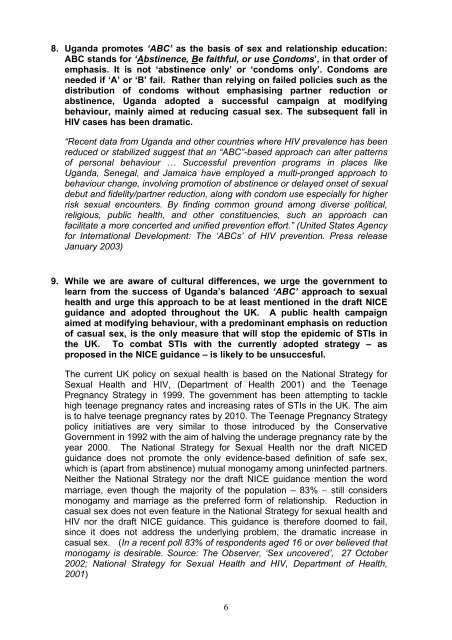STIs & Teenage pregnancy
STIs & Teenage pregnancy - The Maranatha Community
STIs & Teenage pregnancy - The Maranatha Community
You also want an ePaper? Increase the reach of your titles
YUMPU automatically turns print PDFs into web optimized ePapers that Google loves.
8. Uganda promotes ‘ABC’ as the basis of sex and relationship education:ABC stands for ‘Abstinence, Be faithful, or use Condoms’, in that order ofemphasis. It is not ‘abstinence only’ or ‘condoms only’. Condoms areneeded if ‘A’ or ‘B’ fail. Rather than relying on failed policies such as thedistribution of condoms without emphasising partner reduction orabstinence, Uganda adopted a successful campaign at modifyingbehaviour, mainly aimed at reducing casual sex. The subsequent fall inHIV cases has been dramatic.“Recent data from Uganda and other countries where HIV prevalence has beenreduced or stabilized suggest that an “ABC”-based approach can alter patternsof personal behaviour … Successful prevention programs in places likeUganda, Senegal, and Jamaica have employed a multi-pronged approach tobehaviour change, involving promotion of abstinence or delayed onset of sexualdebut and fidelity/partner reduction, along with condom use especially for higherrisk sexual encounters. By finding common ground among diverse political,religious, public health, and other constituencies, such an approach canfacilitate a more concerted and unified prevention effort.” (United States Agencyfor International Development: The ‘ABCs’ of HIV prevention. Press releaseJanuary 2003)9. While we are aware of cultural differences, we urge the government tolearn from the success of Uganda’s balanced ‘ABC’ approach to sexualhealth and urge this approach to be at least mentioned in the draft NICEguidance and adopted throughout the UK. A public health campaignaimed at modifying behaviour, with a predominant emphasis on reductionof casual sex, is the only measure that will stop the epidemic of <strong>STIs</strong> inthe UK. To combat <strong>STIs</strong> with the currently adopted strategy – asproposed in the NICE guidance – is likely to be unsuccesful.The current UK policy on sexual health is based on the National Strategy forSexual Health and HIV, (Department of Health 2001) and the <strong>Teenage</strong>Pregnancy Strategy in 1999. The government has been attempting to tacklehigh teenage <strong>pregnancy</strong> rates and increasing rates of <strong>STIs</strong> in the UK. The aimis to halve teenage <strong>pregnancy</strong> rates by 2010. The <strong>Teenage</strong> Pregnancy Strategypolicy initiatives are very similar to those introduced by the ConservativeGovernment in 1992 with the aim of halving the underage <strong>pregnancy</strong> rate by theyear 2000. The National Strategy for Sexual Health nor the draft NICEDguidance does not promote the only evidence-based definition of safe sex,which is (apart from abstinence) mutual monogamy among uninfected partners.Neither the National Strategy nor the draft NICE guidance mention the wordmarriage, even though the majority of the population – 83% ! still considersmonogamy and marriage as the preferred form of relationship. Reduction incasual sex does not even feature in the National Strategy for sexual health andHIV nor the draft NICE guidance. This guidance is therefore doomed to fail,since it does not address the underlying problem, the dramatic increase incasual sex. (In a recent poll 83% of respondents aged 16 or over believed thatmonogamy is desirable. Source: The Observer, ‘Sex uncovered’, 27 October2002; National Strategy for Sexual Health and HIV, Department of Health,2001)6








